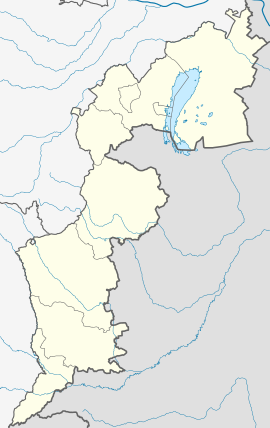Raiding (German pronunciation: [ˈʁaɪdɪŋ]; Hungarian: Doborján, pronounced [ˈdoborjaːn]; Croatian: Rajnof) is a small Austrian market town in the district of Oberpullendorf in Burgenland. It is the birthplace of Franz Liszt.
Raiding | |
|---|---|
 | |
| Coordinates: 47°34′N 16°32′E / 47.567°N 16.533°E | |
| Country | |
| State | Burgenland |
| District | Oberpullendorf |
| Government | |
| • Mayor | Markus Landauer |
| Area | |
• Total | 13.07 km2 (5.05 sq mi) |
| Elevation | 253 m (830 ft) |
| Population (2018-01-01)[2] | |
• Total | 865 |
| • Density | 66/km2 (170/sq mi) |
| Time zone | UTC+1 (CET) |
| • Summer (DST) | UTC+2 (CEST) |
| Postal code | 7321 |
| Website | raiding-online.at |
Geography
editThe municipality lies on Raiding Creek in Middle Burgenland; Raiding is the only borough in the municipality.
History
editRaiding was first documented in 1425 as Dobornya.
Like the rest of Burgenland, Raiding belonged to Hungary from c. 900 to 1920/21. After the end of the First World War, Western Hungary was given to Austria with the Treaties of St. Germain and Trianon; there it formed the new province of Burgenland.
In 1971, Raiding was merged with Unterfrauenhaid and Lackendorf into a larger municipality, which was later dissolved. Raiding has been a market town since 1990.
Population
edit| Year | Pop. | ±% |
|---|---|---|
| 1869 | 713 | — |
| 1880 | 736 | +3.2% |
| 1890 | 880 | +19.6% |
| 1900 | 928 | +5.5% |
| 1910 | 928 | +0.0% |
| 1923 | 976 | +5.2% |
| 1934 | 1,076 | +10.2% |
| 1939 | 994 | −7.6% |
| 1951 | 964 | −3.0% |
| 1961 | 872 | −9.5% |
| 1971 | 846 | −3.0% |
| 1981 | 801 | −5.3% |
| 1991 | 854 | +6.6% |
| 2001 | 836 | −2.1% |
| 2011 | 836 | +0.0% |
Politics
editThe municipal council has 15 seats with party mandates as follows: SPÖ 9, ÖVP 6, FPÖ 0, Grüne 0, and other lists 0.
Culture and landmarks
editBusiness and infrastructure
editViticulture is the main business in Raiding. Other industries there include metal construction and soda water production.
Personalities
edit- Paul Iby, Bishop of Eisenstadt
- Adam Liszt ∞ Anna Liszt
- Franz Liszt, composer and musician
Image gallery
edit-
Birthplace of Franz Liszt in Raiding.
-
Anna Liszt, mother of Franz Liszt (portrait between 1826 and 1837)
-
Franz Liszt
References
edit- ^ "Dauersiedlungsraum der Gemeinden Politischen Bezirke und Bundesländer - Gebietsstand 1.1.2018". Statistics Austria. Retrieved 10 March 2019.
- ^ "Einwohnerzahl 1.1.2018 nach Gemeinden mit Status, Gebietsstand 1.1.2018". Statistics Austria. Retrieved 9 March 2019.


